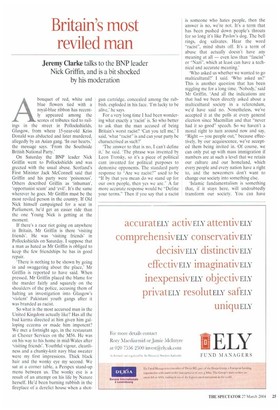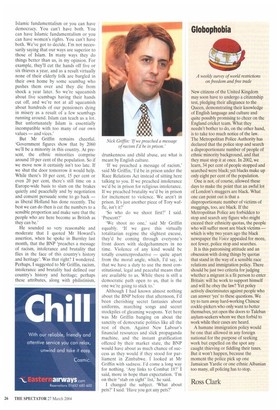Britain's most reviled man
Jeremy Clarke talks to the BNP leader Nick Griffin, and is a bit shocked by his moderation
Lbouquet of red, white and
blue flowers tied with a royal-blue ribbon has recently appeared among the scores of tributes tied to rail ings in the street in Pollockshields. Glasgow, from where 15-year-old Kriss Donald was abducted and later murdered, allegedly by an Asian gang. 'In our hearts,' the message says. 'From the Southside British National Party.'
On Saturday the BNP leader Nick Griffin went to Pollockshields and was greeted with the usual abuse. Scotland's First Minister Jack McConnell said that Griffin and his party were 'poisonous'. Others described Griffin as 'inhuman', 'opportunist scum' and 'evil'. It's the same wherever he goes, Mr Griffin must be the most reviled person in the country. If Old Nick himself campaigned for a seat in Parliament, he'd get an easier ride than the one Young Nick is getting at the moment.
If there's a race riot going on anywhere in Britain, Mr Griffin is there 'visiting friends'. He was 'visiting friends' in Pollockshields on Saturday. I suppose that a man as hated as Mr Griffin is obliged to keep the few friendships he has in good repair.
'There is nothing to be shown by going in and swaggering about the place,' Mr Griffin is reported to have said. When pressed. Mr Griffin placed the blame for the murder fairly and squarely on the shoulders of the police, accusing them of halting an investigation into Glasgow's 'violent' Pakistani youth gangs after it was branded as racist.
So what is the most accursed man in the United Kingdom actually like? Has all the bad karma directed at him given him galloping eczema or made him impotent? We met a fortnight ago, in the restaurant at Chester Services on the M56. He was on his way to his home in mid-Wales after 'visiting friends'. Youthful vigour, cleanliness and a chunky-knit navy blue sweater were my first impressions. Thick black hair and the wonky eye my second. We sat at a corner table, a Perspex stand-up menu between us. The wonky eye is a result of an attempt on his life by Nature herself. He'd been burning rubbish in the fireplace of a derelict house when a shot
gun cartridge, concealed among the rubbish. exploded in his face. 'I'm lucky to be alive,' he says.
For a very long time I had been wondering what exactly a 'racist' is. So who better to ask than the man accused of being Britain's worst racist? 'Can you tell me,' I said, 'what "racist" is and can your party be characterised as such?'
'The answer to that is no. I can't define it,' he said. The phrase was invented by Leon Trotsky, so it's a piece of political cant invented for political purposes to demonise opponents. The standard party response to -Are we racist?" used to be "If by that you mean do we stand up for our own people, then yes we are." A far more accurate response would be "Define your terms." Then if you say that a racist
is someone who hates people, then the answer is no, we're not. It's a term that has been pushed down people's throats for so long it's like Pavlov's dog. The bell rings, dog salivates. Hear the word "racist", mind shuts off. It's a term of abuse that actually doesn't have any meaning at all — even less than "fascist" or "Nazi", which at least can have a technical and accurate meaning.'
'Who asked us whether we wanted to go multicultural?' I said. 'Who asked us?' This is another question that has been niggling me for a long time. 'Nobody,' said Mr Griffin. 'And all the indications are that had we been directly asked about a multicultural society in a referendum, we'd have said no. Nonetheless, we've accepted it at the polls at every general election since Macmillan and that "never had it so good" speech. So we haven't a moral right to turn around now and say, "Right — you people out," because effectively. by our acquiescence, we've accepted them being invited in. Of course, we can only put up with mass immigration if numbers are at such a level that we retain our culture and our homeland, which every people and every nation have a right to, and the newcomers don't want to change our society into something else.
'Islamic fundamentalism is something that, if it stays here, will undoubtedly transform our society. You can have Islamic fundamentalism or you can have democracy. You can't have both. You can have Islamic fundamentalism or you can have women's rights. You can't have both. We've got to decide. I'm not necessarily saying that our ways are superior to those of Islam. In many ways they do things better than us, in my opinion. For example, they'll cut the hands off five or six thieves a year, and as a result virtually none of their elderly folk are burgled in their own home by some scumbag who pushes them over and they die from shock a year later. So we're squeamish about five scumbags having their hands cut off, and we're not at all squeamish about hundreds of our pensioners dying in misery as a result of a few scumbags running around. Islam can teach us a lot. But unfortunately Islam is essentially incompatible with too many of our own values — and vices.'
But Mr Griffin remains cheerful. 'Government figures show that by 2060 we'll be a minority in this country. At present, the ethnic minorities comprise around 10 per cent of the population. So if we move now it certainly isn't too late. If we shut the door tomorrow it would help. While there's 10 per cent, 15 per cent or even 20 per cent, there's still time on a Europe-wide basis to slam on the brakes quietly and peacefully and by negotiation and consent persuade some to go back — as liberal Holland has done recently. The best we can do then is cut the numbers to a sensible proportion and make sure that the people who are here become as British as they can be.'
He sounded so very reasonable and moderate that I quoted Mr Howard's assertion, when he spoke in Burnley last month, that the BNP 'preaches a message of racism, intolerance and brutality that flies in the face of this country's history and heritage'. Was that right? I wondered. Perhaps, I suggested to Mr Griffin, racism, intolerance and brutality had defined our country's history and heritage; perhaps these attributes, along with philistinism, drunkenness and child abuse, are what is meant by English culture.
'If we preached a message of racism,' said Mr Griffin, 'I'd be in prison under the Race Relations Act instead of sitting here talking to you. If we preached intolerance we'd be in prison for religious intolerance. If we preached brutality we'd be in prison for incitement to violence. We aren't in prison. It's just another piece of Tory waffle, isn't it?'
'So who do we shoot first?' I said. 'Prescott?'
'We shoot no one,' said Mr Griffin equably. 'If we gave this virtually totalitarian regime the slightest excuse, they'd be coming through everyone's front doors with sledgehammers in no time, Violence of any kind would be totally counterproductive — quite apart from the moral angle, which, I'd say, is that we have a duty to use the most constitutional, legal and peaceful means that are available to us. While there is still a democratic path open to us, that is the one we're going to stick to.'
Although I had known almost nothing about the BNP before that afternoon, I'd been cherishing secret fantasies about uniforms, marching songs and secret stockpiles of gleaming weapons. Yet here was Mr Griffin banging on about the sanctity of democratic politics like all the rest of them. Against New Labour's financial resources and slick propaganda machine, and the instant gratification offered by their market state, the BNP would have about as much chance of success as they would if they stood for parliament in Zimbabwe. I looked at Mr Griffin with sadness. I'd come a long way for nothing. 'Any links to Combat 18?' I said, more in hope than expectation. 'I'm on their "stab on sight" list,' he said.
I changed the subject. 'What about pets?' I said. 'Have you got any pets?'



























































































 Previous page
Previous page